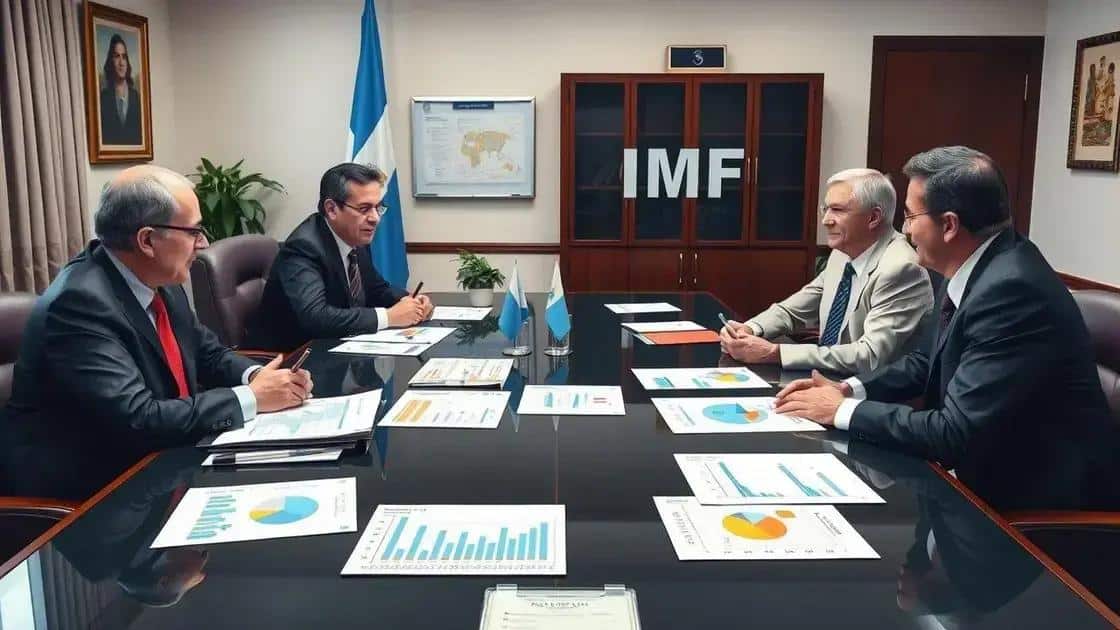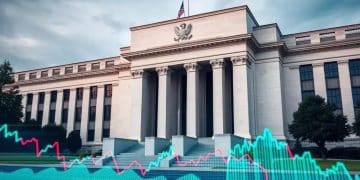Argentina crisis requires IMF assistance: what lies ahead?

Anúncios
The Argentina crisis requires IMF assistance to stabilize its economy, focusing on sustainable growth, social welfare, and effective international engagement.
Argentina crisis requires IMF assistance to address the severe economic challenges the country faces. But what does this mean for the future? In this article, we’ll look at the complexities of this situation and its possible impact on ordinary citizens.
Anúncios
Understanding the depth of Argentina’s economic crisis
Understanding the depth of Argentina’s economic crisis is crucial for grasping the current financial turmoil. This situation reflects a combination of factors, including inflation, currency devaluation, and rising debt levels.
Key Economic Indicators
Several indicators illustrate the severity of the crisis:
Anúncios
- Inflation Rate: Argentina has faced hyperinflation, with rates exceeding 100% in recent years.
- Unemployment Levels: Job losses have surged, leading to sky-high unemployment rates, especially among the youth.
- Debt Obligations: A significant external debt burden adds pressure to the economy, prompting international discussions.
These elements combine to create a challenging environment for everyday Argentinians. The spike in prices makes it hard for families to afford basic necessities such as food and housing. Many struggled just to make ends meet, while the value of savings plummeted.
Historical Context
To better comprehend the current crisis, it’s helpful to look back at Argentina’s economic history. The country has experienced multiple financial crises over the past few decades. Each crisis has built upon the previous one, creating a complex web of economic challenges.
IMF Interventions: The International Monetary Fund has historically intervened to assist Argentina during challenging times. However, these measures have often come with stringent conditions that can exacerbate social unrest.
As residents face difficult choices, many are questioning the effectiveness of these interventions. With each new program, the hope for swift recovery cycles between optimism and skepticism.
With the ongoing crisis, there’s growing concern about how Argentina will resolve these deep-rooted issues. Understanding these aspects is essential for anyone wishing to follow the developments in Argentina closely.
Historical context of IMF interventions

The historical context of IMF interventions in Argentina reveals a pattern of recurring crises and financial assistance. Understanding this relationship is essential for grasping the current economic situation.
Background of IMF Involvement
The International Monetary Fund has intervened in Argentina multiple times since the 1950s, often in response to severe economic distress. These interventions typically aim to stabilize the economy and restore confidence among investors.
- First Major Intervention (1980s): The IMF stepped in during the debt crisis of the 1980s, providing loans to help Argentina manage its financial obligations.
- 2001 Crisis: After years of economic mismanagement, Argentina defaulted on its debt, leading to another IMF bailout aimed at restoring market stability.
- Recent Interventions: More recently, the IMF provided a record $57 billion loan package in 2018, designed to support the government against mounting economic challenges.
Each time the IMF intervenes, it comes with strict conditions that often require austerity measures. These measures can lead to public discontent and social unrest, as citizens face increased taxes and reduced public services.
Impact of Austerity Measures
These austerity measures, while aimed at financial recovery, often hit the most vulnerable populations the hardest. Families struggle to meet basic needs while economic reforms take their toll.
Additionally, the prescription of economic reforms varies with each administration, making it difficult for citizens to adapt. This inconsistency adds to the economic instability and distrust in government solutions.
Through the years, repeated IMFs interventions highlight a cycle: economic crisis leads to international assistance, which often fails to address the root causes of the problems. Understanding this cycle is critical for anyone looking to follow the developments in Argentina’s financial landscape.
The role of global markets in Argentina’s recovery
The role of global markets in Argentina’s recovery is crucial for understanding how the economy can regain stability. After years of financial distress, Argentina’s engagement with the global economy can facilitate a turnaround.
Investment Opportunities
Global markets present a variety of investment opportunities that can aid in Argentina’s recovery. Foreign investment can provide necessary capital for growth.
- Agriculture: Argentina is known for its agricultural exports, which are vital for boosting foreign exchange.
- Renewable Energy: Investments in renewable energy projects can create jobs and contribute to sustainable growth.
- Technology Sector: The technology industry is growing rapidly, offering new avenues for investment and innovation.
These sectors not only attract foreign investors but also stimulate domestic economy growth. The government must create favorable conditions to make these sectors attractive to global investors.
Trade Agreements
Additionally, trade agreements played a significant role in establishing partnerships that can help Argentine products reach international markets. By reducing tariffs and barriers, these agreements increase competitiveness.
Furthermore, they allow Argentina to diversify its exports, reducing dependency on any single market. This diversification is important for building resilience against global economic shifts.
As global markets react to Argentina’s economic policies, the potential for recovery hinges on international relationships. Establishing trust with global partners is essential in this interconnected world, influencing Argentina’s ability to bounce back.
Implications for future economic policies

The implications for future economic policies in Argentina are critical as the country navigates its economic crisis. Policymakers face tough decisions that will shape the nation’s financial landscape for years to come.
Key Considerations
As the government prepares to implement new strategies, several key considerations emerge:
- Sustainability: Future policies must focus on sustainable growth that does not rely solely on foreign aid.
- Social Welfare: Protecting vulnerable populations is essential to ensure that economic recovery benefits all citizens.
- Debt Management: Addressing existing debt while creating strategies to avoid future debts is crucial for financial health.
Transitioning to these policies is vital for rebuilding trust among citizens and investors. The government’s approach to fiscal responsibility will significantly impact economic stability.
Engagement with International Bodies
As Argentina implements these policies, engaging with international financial institutions like the IMF will remain important. The ongoing relationship can help guide best practices and reforms. However, maintaining a balance between necessary reforms and protecting local interests is a delicate matter.
Furthermore, collaboration with global economic partners can provide additional resources and insight. Argentina must strategically position itself to leverage these opportunities while prioritizing national interests.
With effective implementation, future economic policies can pave the way for recovery. This not only demands strong leadership but also active participation from all sectors within society.
In conclusion, understanding the Argentina crisis and its connection to IMF interventions is essential for grasping the complexities of the country’s financial landscape. Future economic policies must focus on sustainable growth, engage with global markets, and prioritize social welfare. By addressing these key areas, Argentina can work towards recovery and stability. The collaboration between the government, international bodies, and local communities will be vital in overcoming the challenges ahead.
FAQ – Frequently Asked Questions About Argentina’s Economic Crisis
What is the main cause of Argentina’s economic crisis?
The crisis is driven by a combination of high inflation, increased debt, and poor economic policies that have led to instability.
How does the IMF assist Argentina during a crisis?
The IMF provides financial support and guidance, usually accompanied by strict economic reform conditions aimed at stabilizing the country’s economy.
What are the potential impacts of future economic policies?
Future policies should aim for sustainable growth, focus on social welfare, and improve debt management to foster economic stability.
Why is global engagement important for Argentina’s recovery?
Engaging with global markets can attract foreign investment, boost trade, and improve economic recovery through international partnerships.





